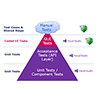Automation Testing Services
Achieve quicker time-to-market, reduce costs, and ensure superior quality with scalable test automation solutions.
Software Testing Automation
Test automation significantly shortens regression testing timelines and speeds up product launches, leading to considerable cost savings. Considering the complexities of various application architectures, multiple environments, third-party system integrations, and a variety of user devices, adopting a standardized and consistent automation approach becomes essential. This approach enhances reusability, simplifies maintenance, and reduces initial costs. As a premier automation testing company, we ensure our test automation solutions align seamlessly with your business needs, developing an automation strategy tailored to your enterprise's overall objectives.

Why Choose QA Genesis For Test Automation?
As a market leader in quality assurance automation testing, we place a premium on long-term relationships and the esteem in the supremacy of the services we provide to our customers. We check our experts' skills and talents by completing a test job, and we are always prepared to boost the team effort significantly.
We not only
Design the architecture
Develop scripts
Configure the deliverables
We also
Create intelligent and atomic scenarios
Integrate Tests
Take the burden of automated testing off your shoulders
How Do We Ensure That We Deliver The Best In Class Quality Assurance Automation Services?
When it comes to testing automation, the most critical features are credible data of the complete system and frequent and transparent communication. Additionally:
Pros of Automation Testing






Issues with UI Test Automation
While automated testing is advantageous and speeds up the release cycle, it may present challenges for under-skilled automation teams.
The most critical of these issues are run time and stability. This is usually not an issue with dozens of tests, but it becomes an issue when your company rises, and your test framework includes many tests. When they begin screwing up haphazardly and inhibiting timely releases, your team will become highly agitated, as no one knows whether the test application or the test suite contains a bug. Think about running a large number of tests over an extended period.
The reason why most automation tests fail:
The incorrect architecture of the test suite.
The test data is incompatible with the actual data.
Inadequate continuous integration Wrong tool and framework selection.
Absence of critical skills required for automation testing. In 90% of cases, recording and replaying is insufficient.
The regression test scripts may not have adapted in sync with the evolution of the product.
A testing plan that was possibly inconclusive may have lacked a graphical user interface or test functionality.
Automated testing may have been performed on a broad range of test cases, including those that were not appropriate.
Automation may have been added as a last-minute addition rather than being integrated into the overall testing strategy.
Take no chances with a no-name brand. QA Genesis knows how to maximize your return on investment.
Frameworks and Solutions We Use
JavaScript


Protractor

Mocha

Cypress.IO

WebDriver.IO

Codecept.JS

NightWatch

Spectron
Mobile


Appium

Calabash

BrowserStack

SauceLabs

AWS Device Farm
Python


Robot

Nose

Alloe
Java


Selenium

Appium

Selenide

Allure

JMeter
Cloud


SauceLabs

BrowserStack

AWS Device Farm
Ruby


Selenium

Watir

Capybara

Cucumber
PHP


Codeception

Behat
Performance


JMeter

Neoload

Blazemeter

Cucumber
C#


Selenium

Telerik

CodeDUI
Frequently Asked Questions
1.
What is meant by automated testing?
Test automation is the technique of completing software testing operations with little or no human input to maximize efficiency and speed. It is critical to consider while building a test automation strategy that the automated element is often the test execution.
2.
How does automated testing work?
Instead, automated testers spend their time creating tests and iteratively improving them as necessary. However, when the testing is complete, automated testing enables the test to be recycled and the entire process repeated.
3.
What do automated tests cover?
Automated tests cover the following areas:
1. Frontend and backend
2. Load, performance, and stress testing.
3. Testing of functionality and cross-platform/cross-device compatibility.
4. Web, mobile, and desktop applications
5. APIs, if available.
4.
Is it worthwhile to invest in automated testing?
Automated testing is critical for ensuring faster cycle times and a minimum quality benchmark. However, while human testing has a place, delegating procedures that you can automate is a waste of time. When time is wasted, money and competition are lost.
5.
Why do we prefer automation?
Automation enables businesses to streamline the execution of complex processes. However, it also assists in cost reduction, simplifies information transfer, prioritizes various operations, monitors their progress in real-time, and allocates resources appropriately.
6.
How much does automated testing save?
Based on our customer service, we know that test automation can save you up to 80% of the time spent on manual testing. The longer it takes to perform a manual test, the more money you can save.
7.
What are the merits of automation testing over manual testing?
Automated testing is more efficient as it enables testers to run more test cases and increase test coverage. However, when manual testing is compared to automated testing, manual testing takes much longer.
8.
Should I incorporate automation testing into my continuous integration process?
Yes, you should. If you incorporate automation testing into your continuous integration/continuous delivery process, you will obtain the following benefits:
1. The process of continual delivery.
2. Numerous avenues for the distribution of test reports.
3. Not a single line of broken code will ever be deployed to the server.